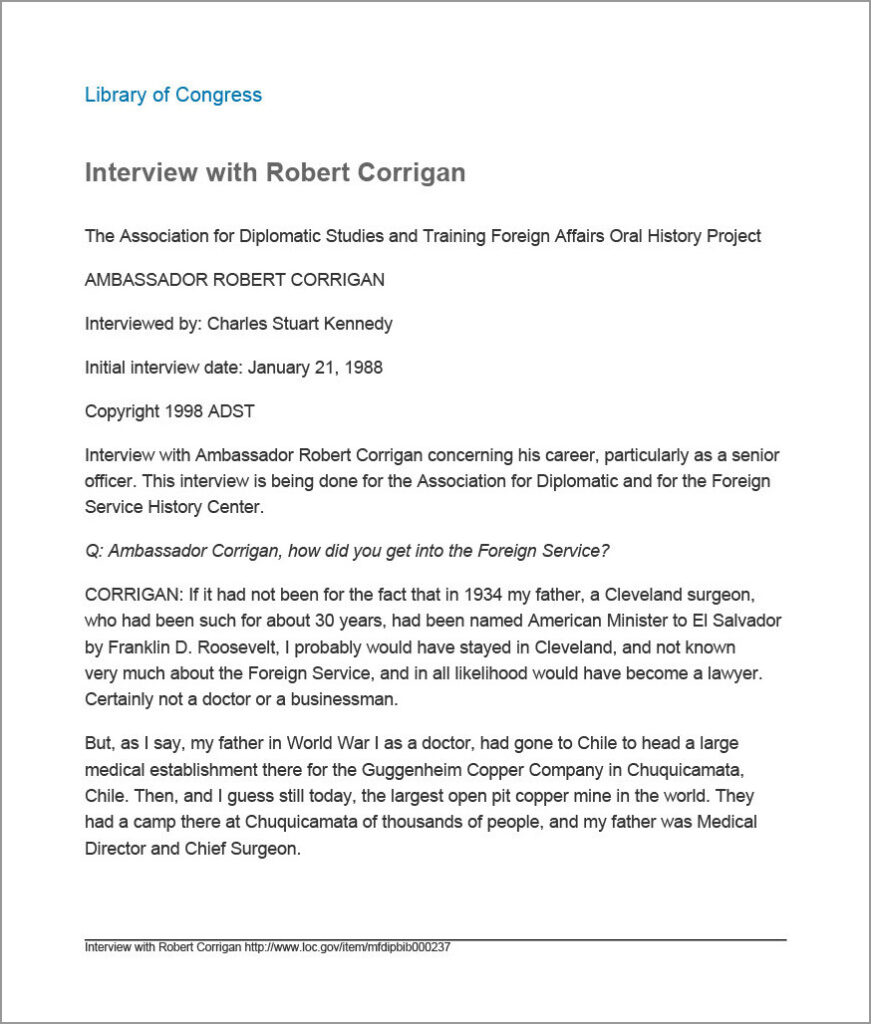Interview with Robert Corrigan

Oral History of Robert Corrigan, U.S. diplomat, 1988
Excerpt Transcript
You may recall that this was the time of the training in Guatemala, and I guess other places, of the Bay of Pigs fighters. Indeed, it was all very clandestine. Cubans were being trained at a finca in Guatemala. A finca owned by a very close friend of the president’s…I guess thousands of men. It was hundreds of men certainly. And actually they were doing it at another site in Guatemala too.But in any event, after the ill-fated Bay of Pigs, I think those chickens came home to roost, and was one of the contributing factors for the Army’s being induced and persuaded to depose the president.
Q: I’d like in a minute to return to the training of the Bay of Pigs people, but before that, and maybe included in that, is what was our interest or policy toward Guatemala? What did we want from Guatemala?
CORRIGAN: …We wanted peace and economic justice. We wanted a consolidation of democracy, and we hoped that the then government of Miguel Ydigoras Fuentes would be replaced in a democratic procedure. There were, of course, substantial American business interests in mining, somewhat in petroleum, the other usual things. A smattering of American business activity of various kinds, including the United Fruit Company, of course, which was very big there at that time. We wanted them to have a fair shake and not be discriminated against in legislation or in implementation of rules and regulations.
Q: Were you noticing any aftermath to the complicity of our embassy, and particularly our ambassador in the overthrow of Arbenz? Bitterness or desire to get us more involved?
CORRIGAN: No, no, not really. Of course, that was a subject that was, you know, always a subject of lively debate…
Q: Well, what about, returning to the period of Cuba, you came to Guatemala just about the time Castro was consolidating his hold in Cuba… Was there a particular threat to Guatemala from Cuba at the time?
CORRIGAN: Cuba, (when I say Cuba, of course, we mean Fidel Castro’s pro-Communist government) I think had more of an animus against Guatemala, both on account of its president, Miguel Ydigoras Fuentes, who was an outspoken anti-Communist, and, of course, had a record of trying to overthrow Castro. Witness permitting the training in his territory of troops to go over there and throw him out. Another aspect, and I’m reminded of this in answer to your earlier question about the heritage or the residue, if you will, from the Arbenz era. It’s true that there was a good deal of Communist influence in the Arbenz government. You recall that Che Guevara was there, and somewhat like, I guess, the situation in Nicaragua today, there were a whole bunch of Communist types who were brought in and were scattered around the infrastructure of government, although certainly not to the degree we see in Nicaragua today. But Ydigoras Fuentes used to comment that one of the residual problems Guatemala had was that during the Arbenz days there had been this considerable penetration by Communists of the government, and they remained throughout the bureaucracy, so that you had always the possibility of their coming to the surface and influencing events…
Q: Well, as DCM how did you get along with the CIA and its operations? I’m speaking, you know, in what one can talk about these things today, and particularly the training. Was the embassy an active participant in this operation, or was it pretty much done elsewhere?
CORRIGAN: The embassy itself, so far as I know, so far as I can recall, had nothing to do with this training operation of Cuban troops prior to the Bay of Pigs. This was an entirely CIA operation. We knew about it—now I’m talking about that from the vantage point of a DCM. I do not know to what degree the ambassador himself was briefed on that subject. I personally thought, and think today, that its a bum way to run a railroad. If you have an ambassador and embassy, and if you can’t trust them with details of a covert operation of that kind…
Questions
What was happening in Guatemala in the early 1960s, (at the time Corrigan was there)?
How was the United States involved in Latin America in the 1960s, both via the State Department, for which Corrigan worked, and via the CIA?
What does this interview tell us about the Cold War in Latin America?
Citations
Kennedy, Charles Stuart. Interview with Ambassador Robert Corrigan. January 21, 1988. Library of Congress, https://www.loc.gov/item/mfdipbib000237/.